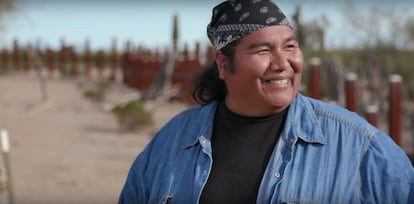“There is no word for wall in our language”
Tohono O’odham nation step up fight against Donald Trump’s proposed US-Mexico border fence
A small indigenous community in the Sonoran Desert has opened up a new front in the battle against US President Donald Trump’s plans to build a wall along the superpower’s southern border with Mexico.

The Tohono O’odham – the name means desert people – have lived on both sides of the border since their lands were arbitrarily divided between the United States and Mexico some 160 years ago. Around 30,000 members of the nation live in Arizona. Meanwhile, several thousand more – and the majority of the nation’s sacred sites – can be found in Mexico.
Trump’s wall would be a coup de grace for a nation whose territory doesn’t respect international borders and the Tohono O’odham have taken the fight to protect their lands to the Washington-based Inter-American Commission on Human Rights.
Our nation has been very poorly treated historically Óscar Velásquez, Tohono O'odham governor
“If they build the wall, it will be over my dead body,” says Verlon José, Vice President of the Tohono O’odham nation.
“There is no word for wall in our language,” explains Jacob Serapo, an indigenous rancher, speaking in a video released by the group to explain its point of view on the issue of the wall.
The vast territory of the Tohono O'odham Nation is roughly the size of the US state of Connecticut and extends along 150 kilometers of the border. This territory was split in two in 1854 with the Gadsden Purchase which saw the US buy parts of southern Arizona and New Mexico from the Mexican government.
Tohono O’odham tribal authorities in Mexico have asked for the country’s National Commission for the Dialog with Indigenous Peoples (CDPIM) to mediate as they fight to prevent the building of a structure along the border.
“This is a clear ‘no’ to the wall because it would affect our ancestral lands, and the flora and fauna of the region, and it would be like eliminating us, especially for members of the nation in Mexico,” says Óscar Velásquez, a Tohono O’odham governor.
Tohono O’odham territory was split between Mexico and the United States with the Gadsden Purchase of 1854
Velásquez adds that the group has not received the support they expected from the Mexican government. “Our nation has been very poorly treated: historically they stripped us of our land and our sacred sites and now they are not paying attention to us,” he says, noting that until the terror attacks in the United States on September 11, 2001, Tohono O’odham people could freely cross the US-Mexico border, but that right is now gone.
Representatives of the nation from the US side of the border have worked with authorities to stop the flow of both migrants and drugs into the United States and are willing to maintain border controls – but without the fence.
Jacqueline Pata, Executive Director of the US National Congress of American Indians and advisor to the Tohono O’odham in the dispute over Trump’s proposed wall, says there is a legal limbo on the question of whether the US president can issue an order to build a wall on Indian reservations on the pretext of bolstering national security. If Trump does do so, he may hit a roadblock in the form of a court battle.
If they build the wall, it will be over my dead body Verlon José, Vice President Tohono O’odham Nation
But Pata believes a negotiated solution is possible and says a lawsuit against the government of the United States is not the only way forward.
“We are convinced that the tribal nationals are sovereign governments in the same way that federal and state authorities in the United States are, and we believe we have the right to be heard and to make decisions about our people and our land,” she says, noting that five other nations along the US-Mexico border and along the US-Canada border could be affected by Trump’s migration policies in the same way as the Tohono O’odham.
English version by George Mills.
Tu suscripción se está usando en otro dispositivo
¿Quieres añadir otro usuario a tu suscripción?
Si continúas leyendo en este dispositivo, no se podrá leer en el otro.
FlechaTu suscripción se está usando en otro dispositivo y solo puedes acceder a EL PAÍS desde un dispositivo a la vez.
Si quieres compartir tu cuenta, cambia tu suscripción a la modalidad Premium, así podrás añadir otro usuario. Cada uno accederá con su propia cuenta de email, lo que os permitirá personalizar vuestra experiencia en EL PAÍS.
¿Tienes una suscripción de empresa? Accede aquí para contratar más cuentas.
En el caso de no saber quién está usando tu cuenta, te recomendamos cambiar tu contraseña aquí.
Si decides continuar compartiendo tu cuenta, este mensaje se mostrará en tu dispositivo y en el de la otra persona que está usando tu cuenta de forma indefinida, afectando a tu experiencia de lectura. Puedes consultar aquí los términos y condiciones de la suscripción digital.









































